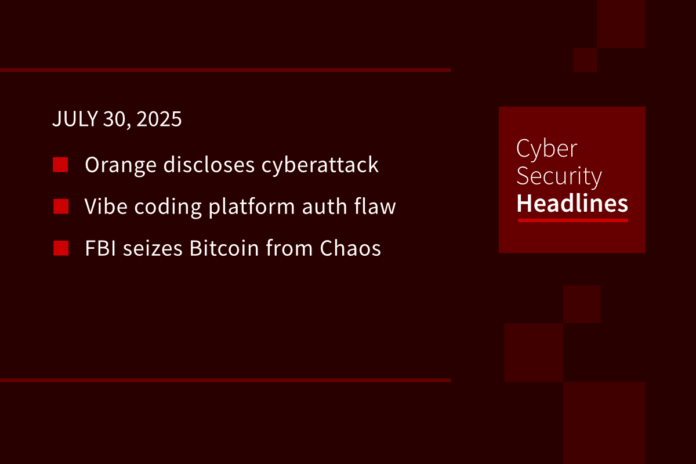What would you do if a major telecommunications company announced it had experienced a cyberattack? For many, this might seem distant or only relevant to those involved in tech or cybersecurity. However, cyber incidents can affect everyone, from everyday customers to entire industries. In this case, let’s talk about Telecom Orange and the recent security breach that made headlines.

This image is property of media.cisoseries.com.
Overview of the Cyber Incident
Telecom Orange, a prominent player in the telecommunication sector, recently revealed a cyberattack on its information systems. This disclosure was made by Orange Cyberdefense, a branch of the company dedicated to cybersecurity efforts. Detected on July 25th, the breach caused some temporary service interruptions for customers in France. While no data theft has been confirmed, the implications of such an attack can be enormous.
Nature of the Attack
The exact nature of how the attack occurred remains unclear. What is intriguing is that the breach shares similarities with previous hacking activities attributed to the Salt Typhoon, a cyber-espionage group reputedly linked to China. Such parallels raise questions about the possible motivations behind the attack, whether espionage, disruption, or something else entirely.
Immediate Impacts
For the customers affected, the repercussions of the cyberattack were more than just an inconvenience. Service disruptions can erode trust in the provider, influence customer relations, and potentially affect financial performance. While you might assume that cyberattacks solely target large corporations, what about individual customers? One must consider how your personal data could be at risk, even if there is currently no evidence to suggest a data breach associated with this incident.
Signs and Symptoms of Cyber Attacks
Understanding the signs of a cyberattack can empower you and your organization to respond more effectively. Here are some common signs to watch out for:
- Service Outages: Unexpected issues such as network outages or disruptions.
- Unusual Account Activity: Unexplained changes to your account, such as unexplained sign-ins or altered settings.
- Slow System Performance: A sudden slowdown in the performance of network services could indicate a cyber incident.
- Unauthorized Transactions: Any transactions or activities not initiated by you should raise red flags.
Being aware of these signs can help ensure you remain vigilant, especially in a world where cyber threats are becoming increasingly sophisticated.

This image is property of cisoseries.com.
The Role of Cybersecurity within Large Organizations
In today’s digital landscape, cybersecurity must be a priority for any organization, particularly for major companies like Telecom Orange. Cybersecurity is much more than merely installing software; it’s about creating a culture where everyone is trained in recognizing potential threats.
Strategies for Prevention
- Regular Training: Staff should be regularly trained in cybersecurity awareness, including recognizing phishing attempts and other social engineering tactics.
- Incident Response Planning: Have a well-defined incident response strategy can significantly mitigate the impact of a breach.
- Continuous Monitoring: Companies must invest in continuous monitoring tools to detect unusual activities as early as possible.
Importance of Collaboration
Collaboration with other stakeholders is also key in improving an organization’s cybersecurity posture. By working together, organizations can share information, pose challenges, and develop better strategies for tackling cyber threats.
Lessons from Telecom Orange
As Telecom Orange recovers from this unfortunate incident, there are a few lessons that can be drawn from their experience. Whether you are part of a major corporation or an individual user, understanding these lessons can help you better navigate the cyber landscape.
Be Proactive, Not Reactive
One of the greatest lessons is the importance of being proactive. Waiting until an incident occurs can lead to significant repercussions. Try adopting preventive measures, such as regular software updates and thorough system security checks.
Transparency Matters
Another critical takeaway is transparency. Companies must communicate openly with both customers and stakeholders during and after a cyber incident. This builds trust and reassures customers that the organization values their security.
Embrace New Technology
Have you considered how adopting effective security technologies can help safeguard against future incidents? Using advanced security solutions, such as endpoint detection and response systems, could prove beneficial.

This image is property of cisoseries.com.
Broader Implications of Cybersecurity Incidents
Cybersecurity incidents in one part of the world can have rippling effects across industries and nations. The impact of the Telecom Orange breach extends beyond just one company—it highlights vulnerabilities that affect us all.
Impact on the Telecommunication Sector
Cyber incidents in telecommunications can lead to severe consequences, including but not limited to:
- Loss of Trust: Customers may turn to competitors if they feel their information is not adequately protected.
- Regulatory Scrutiny: Telecom companies may face closer regulatory oversight concerning their cybersecurity measures.
- Financial Burdens: The costs associated with breaches—such as recovery efforts, legal fees, and damages—can mount quickly.
Effects on Global Cybersecurity Practices
As cyber threats evolve, so must the response from businesses and tech companies across the globe. The breach at Telecom Orange serves as a reminder for organizations worldwide to improve their cybersecurity protocols and stay updated on new threats.
| Area of Impact | Description |
|---|---|
| Customer Trust | Service disruptions can diminish confidence in telecom providers. |
| Regulatory Actions | Possible increased regulatory scrutiny across the telecommunications sector. |
| Financial Consequences | Significant costs associated with recovering from and addressing breaches. |
| International Collaboration | May prompt collaborations between countries to enhance cybersecurity measures. |
Future Considerations
Think about your reliance on telecommunications infrastructure. What could happen if such systems were further compromised? What reassurance do you have that your information and communications will remain secure in the face of evolving cyber threats?
The Emergence of New Threats
The emergence of new threats, such as those exemplified by Scattered Spider—a gang that utilizes sophisticated tactics like SIM-swapping and phishing—underscores the need for constant vigilance. The FBI and other authorities are continuously monitoring these evolving risks, indicating a commitment to keeping citizens informed and safe.
The Rise of Ransomware
Ransomware continues to be a significant concern within the cybersecurity landscape. The FBI’s recent seizure of over $2.4 million in Bitcoin from ransomware affiliates, including a notorious organization known as Chaos, demonstrates the proactive steps being taken to combat these threats. Companies must be aware of the ongoing evolution of ransomware tactics to effectively defend against them.

This image is property of cisoseries.com.
Final Thoughts
As we look back at the incident involving Telecom Orange, it becomes clear that cybersecurity is everyone’s concern—including yours. By understanding the threats, recognizing the signs of a breach, and advocating for robust security practices, individuals can play a vital role in this fight against cyber threats.
While it may seem overwhelming, staying informed and proactive can make all the difference. Whether you’re a consumer or a corporate stakeholder, take these lessons to heart and consider what you can do to contribute to a safer digital landscape.
In the end, the responsibility for cybersecurity falls on all of us, so remain cautious and stay informed—because in today’s interconnected world, cybersecurity isn’t just a tech issue; it’s a vital part of our everyday lives.